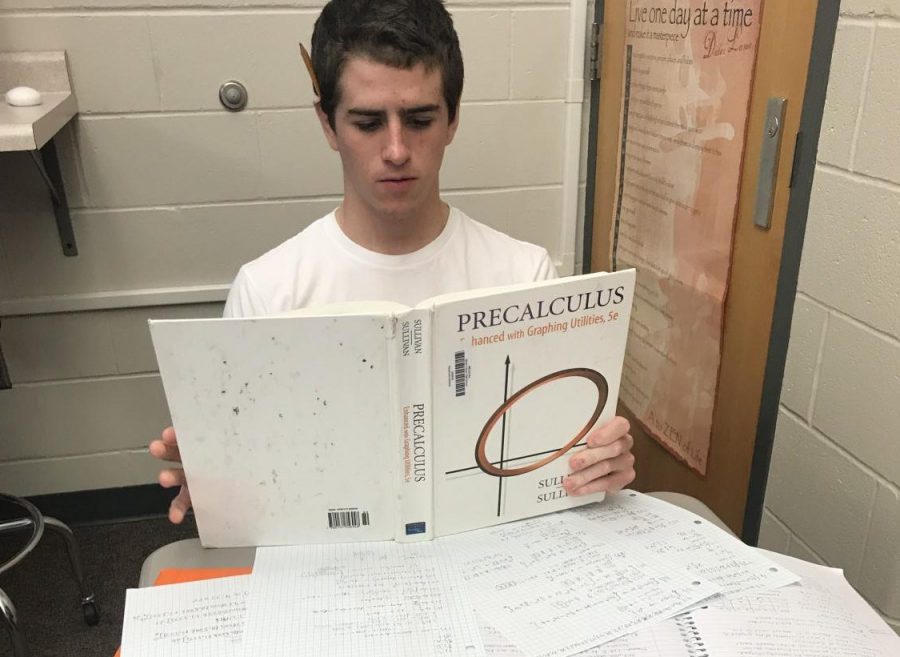How to Master Pre-Calculus
April 26, 2019
By Ryan Clark
Throughout Mount Vernon High School the aura of Mrs. McCollum’s pre-calculus class lingers through the hallways. It smells like a combination of nervous sweat and eraser shavings. Many great math students have been reduced to tears after a strenuous class period in room 215. The difficulty of the class is well-known by every student that attends Mount Vernon and is a trademark when it comes to academics at our school. Each year around 40 students take the class. Senior Caden Eskelsen is currently taking pre-calculus and says pre-calc is difficult because of its rigor, “There are expectations for students to commit to their own learning,” Eskelsen said. “It’s not a class you can slide by in by just doing the bare minimum.”
The pre-calculus class is known for the insane pace it goes through to cover material. Every day students take notes from bell to bell with little time to complete homework assignments or review for assessments. Many students struggle to keep up with this furious pace, so here are some free tips to master the class known as pre-calculus.
While pre-calc is an extremely difficult class there are ways to help boost your grade and become a master in the art of pre-calculus. The best way to enhance your pre-calculus skills is practice and then more practice. According to Mrs. McCollum, “The best practice for students is to complete the assigned homework. I also strongly encourage students to form study groups so that they can review and understand the material. This is a very good skill to have for college.” Choosing not to do homework assignments or a few extra practice problems is a recipe for disaster and will lead to a poor grade on a quiz or test. Since Mrs. McCollum counts homework towards your grade, doing the assignments is an easy way to earn extra points. The points add up over time and could bump that annoying A- up to that majestic looking A. However you can’t rely completely on the homework assignments. Only doing the homework won’t take that D+ and turn it into an A overnight, you still have to perform when the tests and quizzes roll around. That is why completing the homework assignments is imperative and is linked directly to your success.
Extra practice problems outside of the homework assignments are also extremely beneficial for your success in pre-calculus. Senior Paige Zaruba took pre-calculus last year and is currently in the AP calculus class. “Creating practice tests that are similar to the test format was very helpful when I was preparing for a test or quiz,” Zaruba said. Chapter reviews are located in the pre-calc textbook at the end of each section and give you great review problems that will prepare you for the upcoming test. These problems are very time consuming but it is imperative that you make time to go through the problems and figure out any trouble points you are having in solving them. Procrastination is the worst thing you can do. Putting off studying for tests or quizzes and instead deciding to cram the night before is probably the worst approach to take no matter how enticing it seems. Therefore, you should start studying as early as you can and consistently review problems from past sections, so you can ace those upcoming assessments.
While many students are successful studying alone, a useful method for others may be to form study groups with your pre-calc classmates. Senior Ike Appleton loved the study group he took part in last year when he took pre-calc. “I was in a study group that usually met the night before quizzes and tests. We would go over problems that we were having trouble with and we were able to help each other out. It was a great way to better understand the material and prepare for assessments” Appleton said. Study groups are a great way to get help outside of school hours from someone who understands the material. Obviously Mrs. McCollum won’t be there 24/7 to answer all of your questions, even though few have ever seen her eat lunch or leave the classroom, so having classmates available, who understand the material being taught in class, to help you work out those trouble points could make or break your grade in the class. Then again, study groups may not be the best way you learn. If you prefer to work on problems and review by yourself, then, by all means, do it.
The most important thing to know when trying to master pre-calc is that you will get the grade you earn. Choosing not to put the time in to work on review problems and do the homework will lead to your parents, one night after dinner, asking you why there is an “F” under pre-calculus in PowerSchool. At this point you will have to explain to them that instead of reviewing for a test you decided to watch The Office till midnight and tried to cram from 12:01 am to 2:00 am. Doing extra work makes pre-calculus go much easier. “I think putting in the right amount of time can help for pre-calc. Students tend to talk up how hard pre-calc is, but if you stay awake in class and do the homework you should be fine,” Eskelsen said.
Hard work is the most essential tool for a pre-calculus student. This is a college level class which means that if you choose to slack off you are in for a rude awakening. “Pre-calculus is a good class for students to take that want to be prepared for rigorous college courses. The demand on students’ time is much greater than for most high school classes and it requires more independent effort of the type that college necessitates,” said Mrs. McCollum.
If you want to see that majestic “A” underneath pre-calc when you look into PowerSchool then hard work and time management will get you there. Homework assignments, practice problems, and study groups only work if you put the time and hard work into them. By following these tips you can join the elite group of pre-calculus masters.










